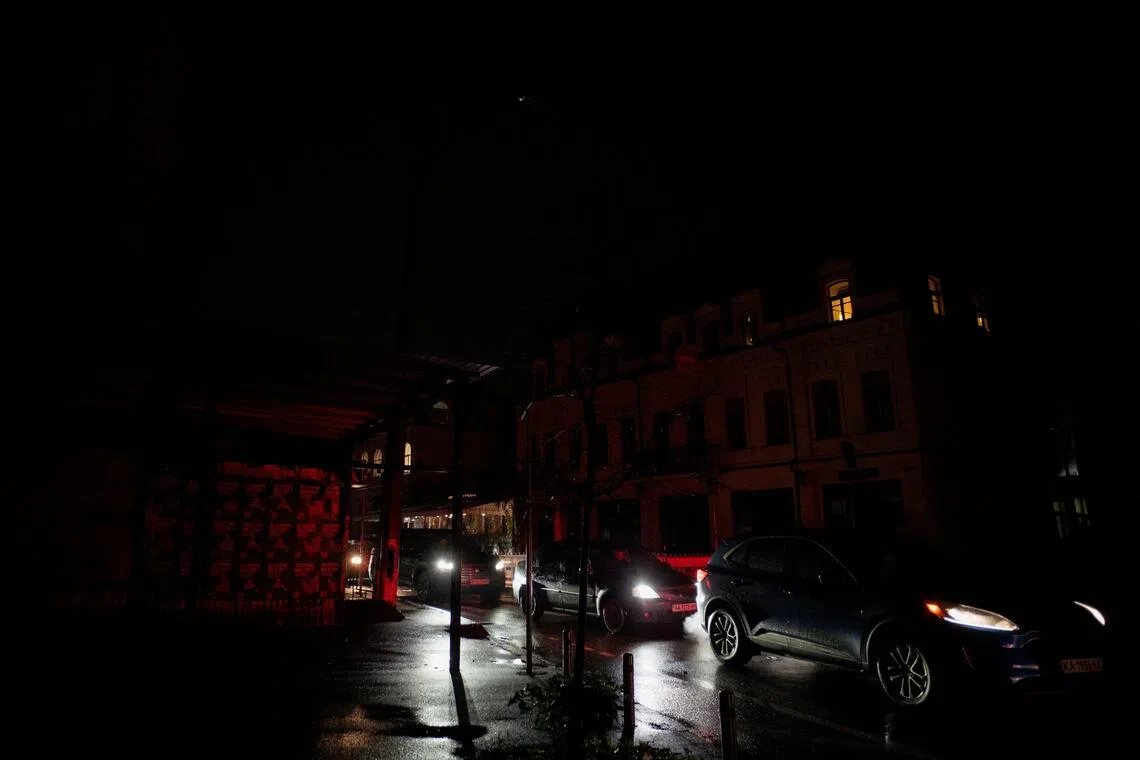Kyiv Braces for Another Dark Winter Amidst Relentless Russian Energy Attacks
As twilight descends upon Kyiv, the Ukrainian capital transforms into a city of shadows, illuminated only by the occasional faint glow of luminous dog collars or the transient headlights of passing vehicles. With Russia's persistent and escalating attacks on energy infrastructure, Kyiv's residents are steeling themselves for what promises to be the most challenging winter since the full-scale invasion began in 2022. The city also grapples with the wider implications of a reported US peace plan that could demand significant concessions from Ukraine.
While previous winters saw a spirit of simply enduring, a palpable shift towards proactive preparedness is now evident.
Dmytro Kustov's Beacon of Hope
Amidst the prevailing darkness, Dmytro Kustov's dance studio stands as a beacon of warmth and light. Inside, pop music fills the air, powered by a meticulously assembled system of a generator and power inverter, discreetly humming in a closet. Kustov, 29, explains his decision: "As soon as the last blackout started, I snapped and decided that all this needed to be set up." Without it, his studio would face four-hour power cuts twice daily. He stresses the critical need for light, warmth, and a space for people to gather, train, communicate, and release emotions, offering a semblance of hope in difficult times.
Mounting Concerns Over Energy Resilience
Concerns regarding Ukraine's energy resilience are mounting. Although the extent of damage to the gas network remains undisclosed, local estimates suggest a staggering 60 percent loss in production capacity. While Kyiv asserts sufficient gas reserves for the winter, anxieties persist over the vulnerability of transmission infrastructure. Fears are particularly high that new strikes could trigger widespread heating shutdowns in the capital, home to approximately 3.5 million people, during sub-zero temperatures.
Kustov admits to the inherent stress but notes his brain has largely adapted to the power outages, now a part of daily life. While his generator powers the lights, he concedes a lack of solution for prolonged heating outages. Despite the grim realities, his spirit remains firm: "We’ll hold on." Yet, a touch of longing escapes him: "I want to go to Bali."
Adapting to the New Normal: Daily Routines and Preparations
Across Ukraine, mornings unfold with a grim routine: a phone alert for a minute's silence to honor war victims, an air force report detailing overnight missile and drone attacks, and a message from national energy provider Ukrenergo announcing impending power outages "in several regions," often extending to "most regions" or even "all regions." Kyiv's districts, for instance, operate on a rolling blackout schedule.
Elderly residents like Volodymyr, 66, and his wife Tetiana, 64, exemplify the resourceful adaptation. They rise in the dead of night to complete chores like showering and laundry and to recharge essential batteries. Volodymyr describes a return to ancestral methods, relying on kerosene lamps. Bit by bit, they've accumulated batteries, generators, rechargeable bulbs, and gas canisters. A dusty gas stove on their terrace awaits the day all other backups fail. Volodymyr confidently states, "If there’s no gas, there will be firewood – I have it." Tetiana, however, harbors more anxiety, particularly for her 85-year-old aunt living alone, unable to make such extensive preparations. She recalls the initial disbelief during the first full winter of war (2022-2023), when many hoped the crisis would simply pass, much like the war itself.
Shifting Mindset and Cost Barriers
This mindset has unequivocally shifted. Epicentr, a home improvement hypermarket chain, reported a threefold increase in generator sales and an eight-fold surge in power banks and camping burners following a significant strike on October 3. However, the cost remains a formidable barrier. Kustov's studio setup, costing about US$1,100 (S$1,434), represents twice the average monthly salary.
During a rehearsal break, Kustov's dancers share their own experiences of water cuts and the arduous climb up 20 flights of stairs when elevators fail. They note the bombings are "getting worse," evoking a chilling sense of being "back in 2022." As for facing the cold, their solution is simple and resilient: "I think we’ll just bundle up. Or dance."

